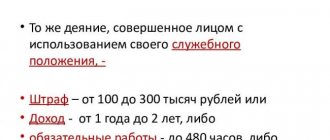What is petty theft - a crime or an administrative offense? And where is the line when crossing which a person will be subject to criminal prosecution? After all, administrative punishment, although unpleasant, does not entail a criminal record.
Petty theft is a cross-industry category. Precisely because liability for petty theft is provided for in Art. 7.27 Code of Administrative Offenses of the Russian Federation. And also Art. 158.1 of the Criminal Code of the Russian Federation. And, if the theft was committed with qualifying characteristics (with the threat of using a weapon (robbery), by a group of people, etc.), then it is no longer considered minor. For such cases, the Criminal Code has provided special articles.
What is petty theft
Let's figure out what is included in the concept of petty theft, whether it is a crime or an administrative violation, and how it differs from classic theft. To do this, let's delve into the regulations, but first we note that theft is the illegal taking of someone else's property, free of charge and without the voluntary consent of its owner. It can be committed secretly, openly, by deception (gaining trust), with the use of violence or the threat of violence, and in other forms.
In accordance with the provisions of Article 7.27 of the Code of Administrative Offenses of the Russian Federation, petty theft includes the taking of another person's property of a small amount (its amount is discussed further in the text). In addition, an important circumstance is the manner in which it was committed. According to Art. 7.27, petty theft of someone else’s property is an act committed in the form of theft, fraud and other relatively “peaceful” means. If it falls under Art. 7.27, then this is qualified as an administrative offense and is not a crime.
However, under certain circumstances, petty theft is a crime falling under the Criminal Code of the Russian Federation. According to the provisions of Art. 158.1 of the Criminal Code, this is the act:
- corresponding to the conditions of Art. 7.27 Code of Administrative Offenses of the Russian Federation;
- committed by a person who was previously convicted and has been punished for petty theft under Part 2 of Art. 7.27.
Thus, petty theft is transferred to the category of crimes after its repetition by those previously punished under Part 2 of Art. 7.27 offender. Petty theft is especially common in food supermarkets. This is facilitated by the availability of goods, the ability to easily hide and take them out of the store, keeping them from the cashier.
Often petty thefts are classified as thefts, and there are reasons for this: in Art. 7.27 of the Code of Administrative Offenses of the Russian Federation, theft is specified as one of the forms of this offense. At the same time, theft differs from petty theft in that it can be much more large-scale and daring in its execution. For example, if the value of the stolen property is significant or several people took part in the theft by prior conspiracy.
Signs of petty theft
The criminological characteristics of petty thefts include both an assessment of the nature of such acts and the personal characteristics of the thieves. Petty theft includes acts such as theft or fraud on a minor scale. They are committed in ways that are not dangerous to society, without threats or violence.
The subjective side of petty theft assumes that the thief has financial problems that do not allow him to ensure a normal level of consumption by legal means. Often such acts are committed by people who are confused in life, homeless people, and teenagers from dysfunctional families. If they do this, it is without careful planning of the “operation”, and sometimes spontaneously, under the influence of momentary moods or alcohol.
Composition of the offense and qualifications
First, let’s look at the term “theft” itself. It is interpreted as illegal actions aimed at the gratuitous seizure of other people's property for the purpose of their subsequent appropriation or sale in any way.
The object of the crime is property relations , and the subject is any property that has been withdrawn from civil circulation.
The objective side is expressed in such forms as theft, fraud, embezzlement or misappropriation, but with an important clarification: without the presence of qualifying signs of criminal offenses. In other forms, for example, petty theft, there will be no crime.
Reference. Theft is understood as a secret act characterized by the seizure of other people's objects or money. Moreover, it is secret both for the owner himself and for witnesses.
Fraud is the theft of property by deception or abuse of trust of the injured party.
Appropriation is interpreted as the use of other people's property for one's own purposes without the owner's permission , and embezzlement is interpreted as their consumption.
The crime is completed at the moment when the attacker has already taken possession of other people's objects, which he has encroached on, and is ready to dispose of them at his own discretion or in favor of other persons.
The subject of the offense is a capable person who has reached 16 years of age.
The subjective side is a form of guilt expressed in the form of direct intent, as well as the presence of selfish goals. If the purpose of taking possession of someone else's property was to destroy or damage it, which did not result in causing significant damage, then the offense will be qualified under Art. 7.17 Code of Administrative Offenses of the Russian Federation.
Determining the motives for the offense is also very important for distinguishing it from such a form of theft as robbery. After all, if the criminal knew that he was being watched or could be watched (if there were surveillance cameras), then it would be classified as robbery. Otherwise, it can be considered petty theft.
The subject of petty theft of another person's property is a citizen who has reached 16 years of age and is fully sane.
Punishment for petty theft
So, you already know that petty theft can be an administrative offense or a criminal offense, depending on the circumstances of its commission. In the first case, the offender faces punishment for petty theft under Art. 7.27 of the Code of Administrative Offenses of the Russian Federation, in the second - under Art. 158.1 of the Criminal Code of the Russian Federation. The theft of someone else's property is considered petty if it was not committed in an open form or without the use of violence (threat of violence), and the value of the stolen property is no more than 2 thousand rubles (Part 2 of Article 7.27 of the Code of Administrative Offenses of the Russian Federation).
In Art. 7.27 of the Code of Administrative Offenses stipulates that an act falls within its scope if there are no signs of crimes under Art. 158 and other articles of the Criminal Code of the Russian Federation. Therefore, for example, petty theft by a group of persons by prior conspiracy can be regarded as a crime under Part 2 of Art. 158 of the Criminal Code of the Russian Federation. The statute of limitations for petty theft, recognized as an administrative offense, is two months, and if a judge makes a ruling, it is three months (Part 1 of Article 4.5 of the Code of Administrative Offenses of the Russian Federation). If theft is qualified under Art. 158.1 of the Criminal Code of the Russian Federation, this period is increased to two years (part 1.a of Article 78 of the Criminal Code of the Russian Federation).
Administrative responsibility
Liability for petty theft is provided for in Article 7.27 of the Administrative Code of the Russian Federation. Let us recall that petty theft falls under administrative jurisdiction if the amount stolen does not exceed 2 thousand rubles, and the administrative offense itself is committed in the form of theft and other non-violent actions.
In accordance with the provisions of Art. 7.27 of the Code of Administrative Offenses of the Russian Federation, the following penalties are provided for this offense. In case of theft in the amount of up to 1 thousand rubles (Part 1 of Article 7.27)::
- fine up to 5 times the value of the stolen property, min 1 thousand rubles;
- arrest up to 15 days;
- compulsory work up to 50 hours.
In case of theft in the amount of 1 thousand to 2 thousand rubles (part 2 of article 7.27):
- fine up to 5 times the value of the stolen property, min. 3 thousand rubles;
- arrest from 10 to 15 days;
- compulsory work up to 120 hours.
If the act is qualified as fraud, then the offender faces a fine of up to 5 times the value of the stolen property, minimum 5 thousand rubles (Article 7.27.1 of the Code of Administrative Offenses of the Russian Federation).
Criminal liability
Criminal liability for petty theft is provided for in Art. 158.1 of the Criminal Code of the Russian Federation. It is applied in the case of petty theft committed by a person subjected to administrative punishment under Part 2 of Art. 7.27 of the Criminal Code of the Russian Federation, that is, for repeated petty theft. Under this article, someone found guilty of committing a crime may be given one of the following punishments:
- a fine of up to 40 thousand rubles (or in the amount of salary or other income for a period of up to 3 months);
- compulsory work up to 180 hours;
- correctional labor for up to 6 months
- restriction of freedom up to 1 year;
- forced labor for up to 1 year;
- arrest up to 2 months;
- imprisonment for up to 1 year.
What actions are considered theft?
The answer to the question of what theft is was given by the Supreme Court of the Russian Federation. So, theft is the illegal gratuitous seizure and (or) conversion of someone else’s property for the benefit of the perpetrator or other persons, committed for personal gain, causing damage to the owner or other holder of this property. It’s a rather cumbersome design, but all the elements must be there to qualify the action as theft. Namely:
- selfish goal - the desire to obtain property benefits, to cause damage to the owner of such property
- illegality - a person has no rights to commit such actions. Even supposed ones.
- gratuitous seizure - the property ceases to be in the possession of the owner, an equivalent replacement is not provided
- damage to the owner arises from the purpose and nature of the actions.
At what age does responsibility begin?
Punishment for petty theft can be applied not only to an adult, but also to a minor. Administrative liability for petty theft begins at the age of 16 (Part 1, Article 2.3 of the Code of Administrative Offenses of the Russian Federation). At the same time, petty theft by minors can be considered by the commission on juvenile affairs, and according to its decision, other measures of influence, rather than administrative measures, can be applied to the offender.
The age of criminal responsibility is established by Art. 20 of the Criminal Code of the Russian Federation, and according to Part 1 of this article, in the general case it is 16 years. Part 2 of Article 20 of the Criminal Code of the Russian Federation reduces it to 14 years for crimes committed under a number of articles, including Art. 158 (“Theft”), however Art. 158.1 is not included in this list. Therefore, thieves from the age of 16 face criminal liability, as well as administrative liability.
General information on the offense
The value of stolen property is assessed taking into account the prices in effect at the time the offense was committed. If there is no cost, an expert is involved in the work, whose responsibilities include determining it.
Consideration of cases under Art. 7.27 of the Code of Administrative Offenses of the Russian Federation relates to the jurisdiction of magistrates. It is important to take into account the statute of limitations for the offense - it is 2 months from the date of its commission.
An offense is qualified if two conditions are met:
- illegality of methods used to seize property (for example, fraud),
- the offender lacks ownership of the stolen items.
The social danger of the act is expressed in the illegal enrichment of the offender and causing property damage to the owner, while the right of ownership is guaranteed by the Constitution of the Russian Federation.
The subject of an offense can only be property that has the characteristics of a thing and has a value. Consequently, they cannot have copyright, related and intellectual rights.
Liability of minors
Punishment for minors is assigned differentially. What matters is the age of the offender, whether he has income and property
It is also taken into account whether the guardians and parents are guilty of committing the theft. There are the following methods of influencing juvenile offenders:
- Fines. The penalty amount for secret theft ranges from 1 to 50 thousand rubles.
- Occupational therapy. The duration of correctional labor will be regulated depending on the age of the child. A teenager between the ages of fourteen and fifteen years can work for a maximum of two hours a day. Three hours a day is the maximum duration of correctional labor for a teenager between the ages of fifteen and sixteen.
- Restriction or deprivation of liberty.
The theft of someone else's property will be punished more severely if the crime is committed repeatedly or by a group of people. In order for the offender to take the path of correction, the teenager may be sent to a correctional facility.
Opportunities for petty theft open up in shops, public transport, and entertainment centers. In places where there are a lot of people, it won’t be difficult to take away the thing you like. Taking property can be in the form of theft, fraud or embezzlement. Robbery, robbery and other punishable acts do not fit this concept. Most often, theft will be committed in the form of theft, i.e. secret taking of someone else's property. Fraud occurs less frequently. If the criminal can be found, the consequences established by law will follow. Theft is an illegal act, and it is punished not only in the Russian Federation, but in Belarus, Ukraine, and other countries. It is more difficult to bring criminal liability than administrative liability. In this case, all requirements stipulated by criminal procedure legislation must be met: interrogation, identification of violators and confrontation.
What is the liability for theft under the article of the Criminal Code of the Russian Federation?
The most important factor distinguishing theft from robbery or robbery is that the crime must be secret. This means that the thief understands that he is stealing someone else’s property, that his actions are illegal, and therefore seeks to hide his act. Confiscation of material assets carried out in the presence of persons who are unable to adequately respond to what is happening (children or mentally ill people) is also regarded as theft and entails criminal liability. If these signs are absent, as well as secret intent, this will serve as a reason to define the crime as robbery or robbery.
Types of punishment
In the general understanding, punishment is the reaction of society to any offense committed.
Individuals and legal entities, citizens of Russia or a foreign state, as well as those without citizenship at all, officials, military personnel and others can be punished. In other words, any person or organization can receive punishment.
According to their type, the crime and the corresponding punishments are divided into:
- Administrative: their main difference from criminal ones is their relative “safety”. They cause less harm to society and do not cause serious harm to a person: for example, driving a car without a license, speeding, violating copyrights, wearing prohibited symbols, throwing garbage in the wrong place.
- Criminal: These are more serious offenses that can result in significant property damage, death or harm to health. This could be theft of property on an especially large scale, receiving or giving bribes, causing intentional or unintentional harm to a person, murder intentionally or through negligence.
Depending on the type and severity of the crime, punishments vary. For administrative offenses the punishment is provided in the form of:
- fine (most common);
- warnings;
- administrative arrest for up to a month;
- confiscation of driver's license;
- temporary ban on the activities of the organization.
These punishments are minor and allow a person to quickly rehabilitate himself in society and then lead a normal life.
Please note: receiving a fine is not perceived by many as a punishment for a crime, especially when it comes to minor violations on the road, for example, parking in the wrong place.
Criminal penalties are more varied and significant:
- fines;
- deprivation of military ranks, awards and positions, restrictions on the right to engage in certain types of activities;
- correctional work;
- restriction of freedom, house arrest or serving a sentence;
- life imprisonment;
- death penalty (in some states, Russia is not one of them).
Special rules for assigning responsibility
It is known that a crime such as theft includes a number of identical illegal actions, such as robbery and fraud. If things are the same with robbery, and the minimum amount stolen should be 5,000 rubles, then with fraud everything is completely different. Fraud is understood as a breach of trust or another form of deception through which someone else's property is stolen.
The monetary equivalent of the stolen property required for law enforcement agencies to initiate a case under article fraud must be 10,000 rubles. Fraudulent actions differ from theft primarily in the severity of the consequences and, of course, in more severe punishment.
Liability for fraud is regulated by Article 159 of the Criminal Code of the Russian Federation. According to its content, prosecution for theft by fraud is possible only in the following types of damage:
- significant damage meets the minimum limit and amounts to 10 thousand rubles;
- a major material loss must be more than 3 million rubles;
- an especially large amount of damage is established with a minimum limit of 12 million rubles.
The punishment for each crime will be different, it should be noted that the differences will also relate to the circumstances of the commission of this violation. Sanctions for the same amount stolen through credit fraud, insurance and computer fraud will be completely different. If we are talking about economic crimes, then each norm of the law has its own, clearly indicated minimum amount of damage. If there is fraud according to all qualifying criteria, but the amount of damage is 1000 rubles, then the culprit will be held administratively liable.








